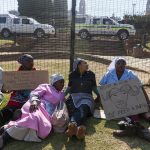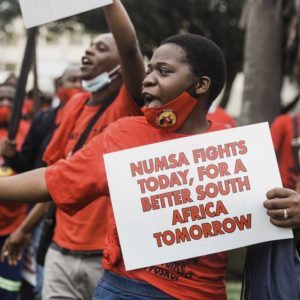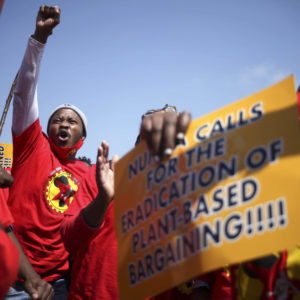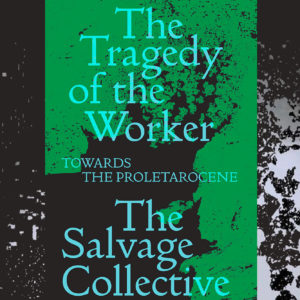Striking workers reach agreement with South Point
Workers at a student accommodation company, which earns most of its revenue from National Student Financial Aid Scheme funds, have ended their eight-week strike for better conditions.
Author:
2 November 2021
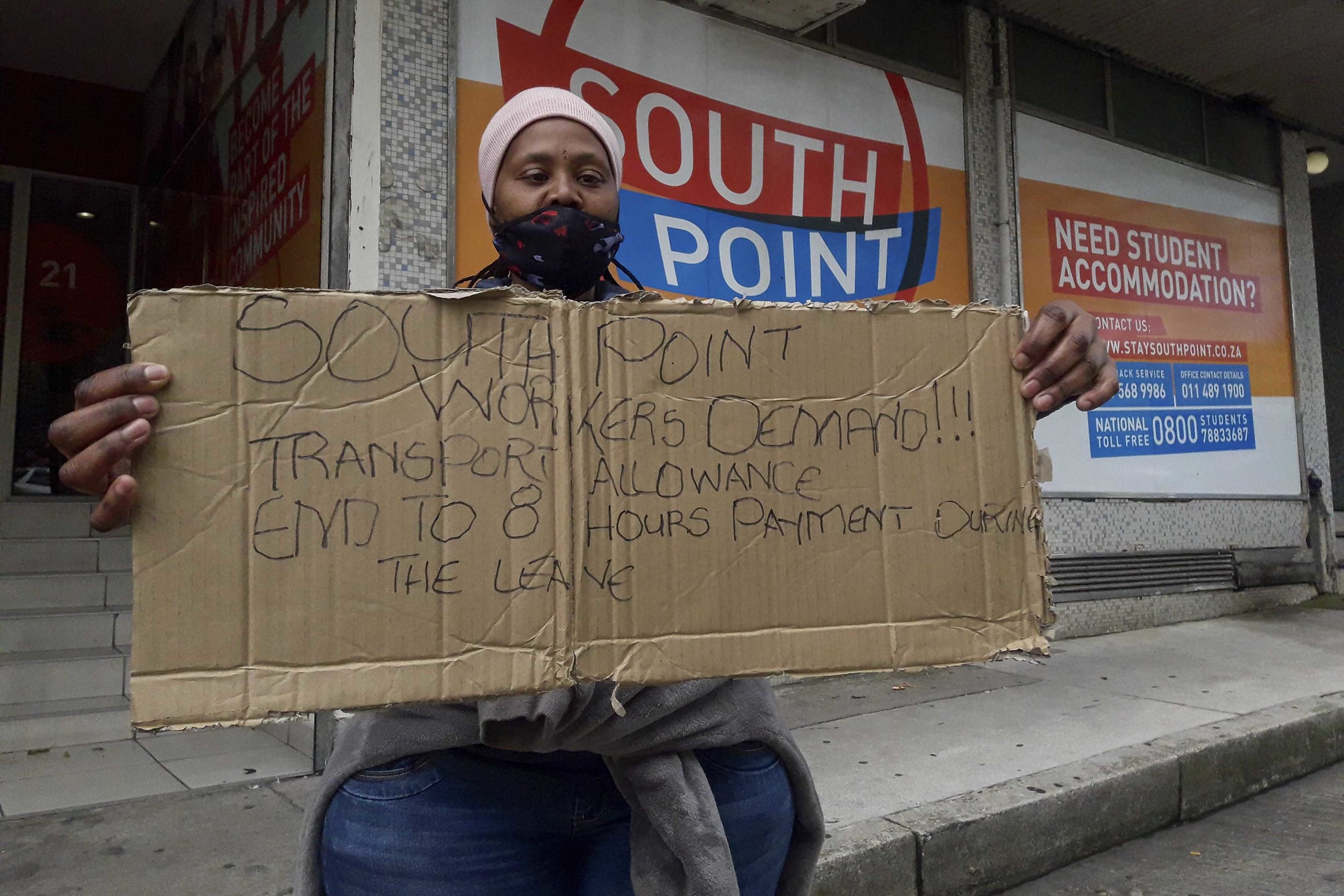
An eight-week strike by student residence workers has thrown the spotlight on private landlords who build property empires from public National Student Financial Aid Scheme (NSFAS) funds.
About 190 cleaning, security and front desk workers went on strike from 1 September to 29 October at South Point, a student accommodation provider, in Johannesburg, Cape Town, Pretoria, Durban and Gqeberha.
Affiliated to the General Industries Workers Union of South Africa (Giwusa), the workers wanted a salary of R12 500 a month, medical aid, changing rooms and canteens, a 13th cheque (instead of a performance bonus) and to be paid the Covid-19 unemployment insurance fund (UIF) temporary relief payments that have been outstanding for a year.
However, they eventually settled on a 5% wage increase, change room facilities, professional development training and for current employees to be considered first when positions in the company become vacant. Giwusa and South Point have also agreed to further discussions on the insourcing of staff, an employee canteen and a transport and housing allowance.
Related article:
Workers currently earn R4 300 a month but, because the company has outsourced many jobs and introduced a “rotation” system, some workers earn just R2 000 a month, says Giwusa president Mametlwe Sebei.
The Workers & Socialist Party (Wasp), which supported the strike, says South Point houses 13 000 students and owns R4 billion in assets. It earns up to R35 000 a year for each student from NSFAS, which amounts to more than R400 million a year in guaranteed rent through state funding. Media reports earlier in the year said South Point derived 70% of its revenue from state funding for students.
“The workers are rendering a public service, accommodating students. This is the responsibility of the government and universities who have decided to outsource that responsibility to a company whose conduct and appalling conditions of employment is nothing short of that of a slumlord,” says Sebei. “This is what South Point is behaving like. They are exploiting workers whose labour they rely on to deliver on their commitment to students.”
Rental boycott
In the sixth week of the strike, with no movement from South Point, Giwusa and the Socialist Youth Movement, which supported the strike, called on non-profit advocacy groups that have offices in the South Point Corner building in Braamfontein, Johannesburg, to boycott rent payments in solidarity.
“It is clear that they [South Point] are being emboldened by a lack of clear support and concrete actions on the part of tenants. We are therefore asking for tenants, especially those professing commitment to social justice, to take a position. In the circumstances, nothing short of a rental boycott will do,” says Sebei.
Some of the organisations, which include New Frame, WoMin, Lawyers for Human Rights, Section27, The Forge and 350Africa.org, said they supported the rent boycott call and contributed funds towards the striking workers’ transport costs.
Related article:
New Frame, The Forge, Lawyers for Human Rights and Section27 also wrote a letter to South Point, insisting the company promise not to dismiss or victimise workers who participated in the strike.
“As progressive organisations with a deep commitment to human rights and social justice, we are concerned that the workers’ rights to protest might have been infringed upon during this protracted strike and that they will further be prejudiced by the company’s refusal to come to an agreement on a peace clause,” the three organisations wrote.
“We wish to state categorically that we stand in solidarity with workers’ rights to peaceful, lawful and legitimate protest. Our own observations are that the workers have been peaceful.”
Show of support
The Socialist Youth Movement also set up a Braamfontein Community Forum to support the workers. Meetings of this forum took place on the picket lines outside South Point Central.
Zaki Mamdoo of the Socialist Youth Movement says the forum has been a great success as the tenant organisations put on “a tremendous show of solidarity and support [which] has heartened the spirits of the workers and put South Point on the back foot”.
He says South Point wants to “gradually dismantle the union”.
Related article:
The strike has brought into focus South Point’s alleged violation of the constitutional right to freedom of expression. Giwusa is representing former South Point shop steward Luka Thomo at the Commission for Conciliation, Mediation and Arbitration after he was dismissed for speaking to the media about the reduced Covid-19 UIF temporary relief payments the workers received in 2020.
During the strike, workers in Gqeberha said they too were not allowed to speak to the media.
At risk at work
Speaking on condition of anonymity, some workers said they had come into contact with students who had tested positive for Covid-19 since the pandemic began, but were forced to continue working.
“We monitor the students’ temperatures and sanitise them when they enter the building, but our problem is when a student has tested positive for Covid-19. They are taken away to quarantine, but work for us continues as normal at South Point. The bosses don’t even fumigate the building, let alone the room of that student, which exposes employees to the virus,” says a 45-year-old female employee.
Workers confirmed that they lost wages after being put on a rotating system. “Some of us have been underpaid and only received R2 000, which the employer did not bother to explain to us. Our agreement with South Point was that our salaries will be R4 300,” says a worker.
Another says workers are forced to change in dirty rooms with no lockers.
Related article:
South Point released a statement saying it had made all Covid-19 UIF temporary relief payments to employees, except for the June 2020 payments, which it said it did not receive. The student accommodation provider agreed in the same statement to provide changing rooms. It denied providing “dirty” changing rooms without lockers as alleged by workers in Gqeberha.
During the strike, South Point adopted a hard line, saying it would not provide staff loans, nor medical aid, housing or transport allowances, nor would it increase the number of front desk and maintenance staff. “Unfortunately, it’s completely impossible during the current economic environment,” the company said, adding that it was “unreasonable” for Giwusa to demand that it insource cleaners, as cleaning is “not one of our core competencies”.

